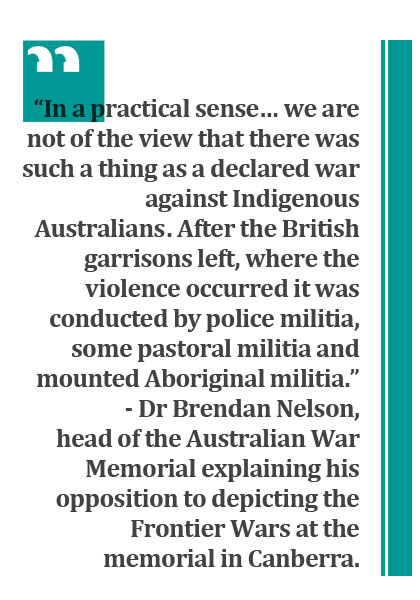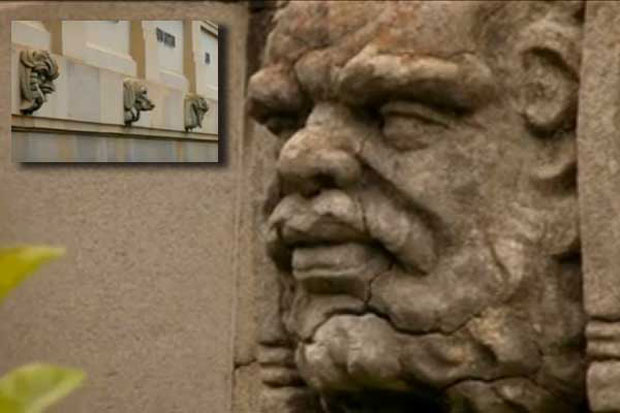The head of the Australian War Memorial has again claimed there was no declared war between Aboriginal tribes and settlers on the colonial frontier, and says if the institution were to acknowledge the ‘frontier wars’ it would also have to present the conflicts between Aboriginal people before invasion.
But that’s been debunked by a leading scholar on the frontier wars, who says the only time Australia declared war was during the Second World War.
The director of the Australian War Memorial, Brendan Nelson – the former Opposition leader who delivered a speech in reply to the National Apology – was recently questioned by Senator Nick Xenophon during a senate estimates hearing. Xenophon was probing the national institution’s continual refusal to represent the first wars of this country, where thousands of Aboriginal people died defending their lands against colonialists stretching over nearly 150 years.
There have been continual calls from Aboriginal groups for recognition of the nation’s first wars at the Australian War Memorial. A recent Frontier Wars march to shadow the official ANZAC Day commemorations and lay a wreath to remember the thousands of stolen Aboriginal lives, was held up this year by police, with Aboriginal attendees threatened with arrest.
An Aboriginal journalist from NITV News who filmed the scuffle was bullied and intimidated by police, and attempts were made to seize his footage.
The Australian War Memorial has continually said that there was no declared war between Aboriginal tribes and colonialists, and while you can find memorials dedicated to nurses, animals and a planned exhibition for war correspondents, there is no mention of the Frontier Wars anywhere in the AWM.
The only Aboriginal recognition comes in the form of two gargoyles of Aboriginal men, which are placed alongside gargoyles of flora and fauna overlooking the ‘Pool of Remembrance’.

Senator Xenophon last week questioned Dr Nelson on this position, and prefaced his questions by acknowledging the Australian Defence Force Academy (ADFA), “where our future officers are trained”, currently taught the history of the frontier wars to its cadets.
But Dr Nelson responded by claiming again that the story of the frontier wars “needs to be told in the context of the full relationship”.
He claimed that the National Museum of Australia is a more suited institution, and knocked back suggestions there was a “war” between Aboriginal tribes and settlers.
“In a practical sense… we are not of the view that there was such a thing as a declared war against Indigenous Australians,” Dr Nelson said.
“After the British garrisons left, where the violence occurred it was conducted by police militia, some pastoral militia and mounted Aboriginal militia.”
Nelson compared the Australian War Memorial to the Canadian equivalent, which recognises the early wars during colonisation, but also the conflict between First Nations tribes.
“If the Australian War Memorial were to go into telling these stories, I suspect we would have to also be telling the stories, as the Canadian War Museum does, of the armed conflict and violence between Aboriginal tribes themselves prior to the arrival of the First Fleet and all the devastating consequences that would have for Aboriginal people.”
But the myth there was no declared war during the Frontier Wars was debunked by renowned historian Henry Reynolds in his recent work the Forgotten War.
“Many observers thought what was unfolding on the vast frontiers was a form of warfare. They said so many times over. Other commentators did not talk of war. It was a matter of personal choice,” Dr Reynolds wrote.
“But there seems not to have been the public debate about how appropriate the term was when applied to Australian history. It was a less controversial matter at the end of the 19th century than it became a hundred years later.”
University of New South Wales’ frontier wars expert, Dr John Connor told New Matilda that if the Australian War Memorial wanted to use the argument about “undeclared wars”, they could only commemorate the Second World War.
“The argument about ‘no declared war’ isn’t really a strong one,” Dr Connor told New Matilda.
“The only time the Australian government declared war on anyone was in December 1941 in the war against Japan during the Second World War. Prime Minister Curtin actually declared war in Japan. Menzies was the Prime Minister in 1939 and he didn’t declare war. He said Britain is at war, Britain had declared war and as a consequence Australia was at war.”
That argument has been consistently used by conservatives to argue against formal recognition at the Australian War Memorial.

“… If you are talking about declared wars, it means you would only be talking about that, and not subsequent wars in Korea, and Vietnam and Afghanistan, where there was no declared war.”
Dr Conner also says that the War Memorial was intended to commemorate the First World War, and knocked back calls for commemorations like the Australian contribution in the Boer War.
Yet there is currently an exhibition to the Boer War in the war memorial.
“When the war memorial was established, it only dealt with the First World War,” Dr Connor said.
“But in the 1920s and 1930s it rejected proposals from people who had fought in the Boer War…. And then [they]changed their mind.
“In 1941 the Second World War had already started, so they had to include it in the process of expanding it. And they went backwards in time with the Boer War and included [that as well].
“So if you can go backwards in time and include that you can go backwards in time for the Frontier Wars.”
Donate To New Matilda
New Matilda is a small, independent media outlet. We survive through reader contributions, and never losing a lawsuit. If you got something from this article, giving something back helps us to continue speaking truth to power. Every little bit counts.



